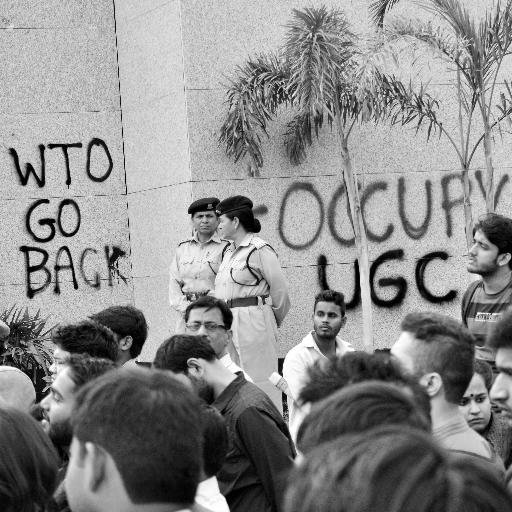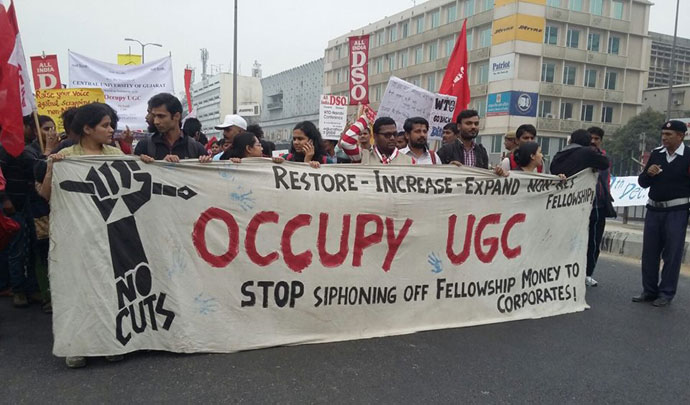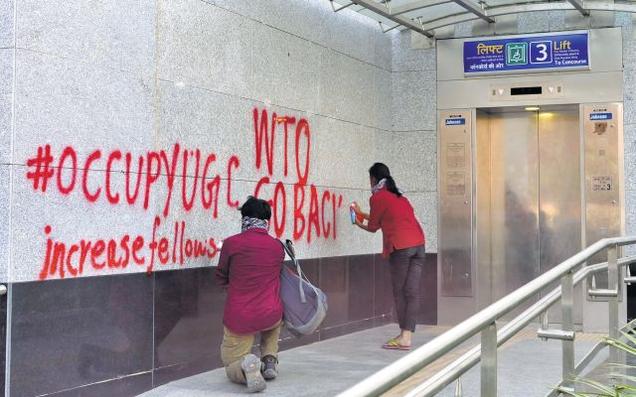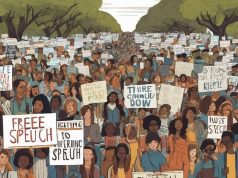It all started on the morning of 20th of October, 2015 when news first surfaced of the UGC non-NET fellowships being discontinued. Sitting in JNU’s 24×7 central library, which stands tall against the politics of fund-cut and austerity, I made a quick Facebook post tagging friends from all different organizations, followed by frantic calls to my fellow-office bearers in the JNU Students’ Union, to which we had been recently elected. Something was to be done against this. We had to launch a massive demonstration against this decision, which we could immediately recognise as being related with the WTO’s takeover of education, which was our primary election issue this year in all the Student Union elections.
Funnily enough, the ABVP had made tall electoral promises such as building of hostels, Wi-Fi, placement cell, etc. at a time when their government at the Centre was steadily cutting down on funding for education, pursuing policies that perpetrate joblessness and displacement, diluting labour laws and land acquisition laws, and preparing to bow down to WTO diktats to bring education under trade services! The ABVP also sought votes on the (hollow) promise that they would get the fellowship amounts increased- a genuine and long-standing demand of the student community which had been raised by several students across the country, including the previous JNU Students’ Union. The non-NET fellowship is a great enabler for students belonging to marginalized backgrounds who have to battle enormous difficulties to acquire an education. Women students have to persuade their families to let them study. Discontinuation of the fellowship would mean that several students belonging to poor, Dalit, Muslim and tribal families, will have to give up the desire for higher education, simply because they cannot afford the fees and other costs of living associated with studying in a Central University. Non-NET fellowship is a minimum, baseline amount of stipend necessary for every scholar to sustain themselves. With the rising costs of living, even the current amounts of Rs. 5,000 and Rs. 8,000 provided to scholars in Central Universities are far too low.
The demand that the amount of non-NET fellowship be increased from Rs. 5,000 to Rs. 8,000 at M.Phil. level and from Rs. 8,000 to Rs. 12,000 at the Ph.D. level is a principled demand, considering the fact that other research fellowships (CSIR, JRF, MANF, RGNF) were increased during the last academic year. An expert committee had also been constituted by the UGC to consider enhancement of the amount disbursed as non-NET fellowship. However, surprisingly, the UGC in a meeting dated 7th Oct, 2015, while considering the issue of enhancement of the fellowship amount, decided to discontinue the non-NET fellowships from the upcoming academic year. This outrageous decision was taken without providing any rationale. The decision defied logic- how can a committee which has been set up to increase the fellowship amount discontinue that fellowship, we asked. There was no other way of making sense of this illogical decision, except to see it as a preparation to fully commercialise education following the WTO diktats. The hollowness of ABVP’s claims was proven barely a month after the election, when this news surfaced and we immediately spread the information widely. That evening, JNU-based organization, DSF, called for an effigy-burning of the MHRD in JNU campus, protesting this decision.
Of course, UGC had not taken this decision on its own. The professed “autonomy” of UGC is mere eyewash- this decision was taken on the orders of their political masters in MHRD. However, there was an additional linkage that had to be made- the government was planning to surrender the political sovereignty of India to the WTO, so the MHRD could also not do much. The reins were in the hands of the WTO already. Meanwhile, the Delhi University unit of AISA had already given a call for gheraoing the UGC office the next day, that is 21st of October. We, as JNU Students’ Union, also called for an urgent protest demonstration outside UGC on the same day and numerous students from all universities in Delhi responded to the call.
However, surprisingly, the UGC in a meeting dated 7th Oct, 2015, while considering the issue of enhancement of the fellowship amount, decided to discontinue the non-NET fellowships from the upcoming academic year.
When we reached UGC the next day, students from Delhi University and Jamia Millia Islamia were already demonstrating and were attempting to break open the gate of the UGC, braving police lathis. When JNU students joined them, we managed to break open the gate, locked from inside, and we entered the UGC premises. We demanded to meet the UGC Chairperson, Mr. Ved Prakash, under whose supervision the decision to withdraw the fellowship had been taken. However, we were denied an audience with him. Instead, we were greeted with helpless faces who wasted enough of our time before we went outside and told the protestors that we would camp inside the UGC premises until we are provided with a concrete answer. Thus began, Occupy UGC- a name that has become synonymous with the anti-privatisation, anti-WTO sentiment throughout the country. We submitted a written memorandum to the UGC Chairperson, demanding that the decision to withdraw the fellowship be revoked, that the amount of fellowship provided be increased and that the fellowship be extended to all universities, including state universities.
Difficulties started revealing themselves from day one- we were not allowed to use the washrooms inside the UGC building by the police, we were not even allowed to drink water from the water coolers kept in the building. This was a ploy to discourage female participation in the protests. Finally, a nearby mosque supported us by throwing open its facilities for all the protesters, thus making possible the prolonged female participation in the protests. On 21st October night, we slept on placards! On the intervening night of 22nd and 23rd October, ABVP members from Delhi University showed up late night, drunk, hurling abuses and pelting stones at us. Since the 22nd of October was Dussehra holiday, we had decided to gherao the UGC Chairperson on Friday, the 23rd of October, the last working day that week. However, early in the morning, that is, few hours after the ABVP members showed up, the police picked us up and lodged us in a remote police station near Bhalaswa Diary on the outskrirts of Delhi, disrupting our planned action.
Hearing the news, some of our comrades, who were not detained, mobilized a fresh set of protestors from JNU and DU who again assembled at UGC office. So, while hundreds of us were detained, students gathered in even larger numbers to demand our release and continued to raise the demand for restoration and increase of non-NET fellowship and opposed the sellout of higher education to WTO. The students were brutally lathi-charged and several of them, including girls were badly injured. One female student from DU was hit on the head by police with a baton! This move was widely condemned by teachers, researchers and academicians across the country and even abroad. Inside the police station, we were delighted to read the statement brought out by teachers in our support. Later that day, we were released and dropped in huge police buses at JNU, where, without stopping to catch our breath, we immediately set out to campaign in every hostel mess to re-occupy UGC on the 25th of October, 2015. After that, we faced one more detention and lathi-charge, but we again decided to re-occupy UGC after coming out of detention.
The Modi government’s ignorant diktats to scientific research institutions, suggesting that laboratories should generate their own funding, are ridiculous, since this would allow the research agenda to be dictated by the funding agencies which would have vested interests in the research area.
The MHRD brought out one circular after another to mislead students and the media across the country, constantly playing with words to give an impression that the issue had been resolved. The ABVP had, on the 22nd of October itself, said that the non-NET fellowships were not going to be discontinued, but we exposed their hollow claims soon. The HRD ministry decided to set up a committee to look into the matter but did not give it the mandate to consider increase of the fellowship. Also, the committee seeks to impose dangerous conditions on the award of non-NET fellowship, such as ‘merit’ and ‘income’. We have consistently opposed both of these conditions, repeatedly insisting that admission and enrollment in research (MPhil and PhD) should be the sole criterion for awarding the fellowships to every scholar, regardless of family income or whatever the MHRD considers as “merit”. It is farcical that this meritocratic logic is thrown at us by a government whose sole criterion of appointing heads of educational institutions is an RSS membership! We have seen how the government defended the appointment of RSS prachalaks to head the FTII, the ICHR, the ICCR, etc. The non-NET fellowship is a minimum research stipend that every research scholar in a public-funded university must be entitled to. It is not a charity amount, as some media outlets have tried to project. AISA called for a nationwide campaign on this issue in order to clear these confusions. The confusion regarding the status of the fellowship (and the status of the struggle) prevailed because of misleading statements by the HRD Minister and its campus ambassador- the ABVP. Further, the media have largely suppressed the issue and not a single editorial has been dedicated to such a key policy question as the WTO takeover of education. We gave the call for a national mobilization on the issue. Thousands of students marched on the streets of Delhi, responding to our call. However, the media didn’t find it newsworthy.
A researcher produces research that advances scientific knowledge and this requires funding. The Modi government’s ignorant diktats to scientific research institutions, suggesting that laboratories should generate their own funding, are ridiculous, since this would allow the research agenda to be dictated by the funding agencies which would have vested interests in the research area. The interest of various funding agencies may not necessarily coincide with the public interest- a pertinent example here being the research on genetically modified crops. Expecting the companies that manufacture genetically modified seeds to fund research that seeks to study the hazardous effects of these crops on public health is most foolish. Research tends to be in public interest only when publicly funded. Public spending on education is an investment whose results may not be immediately visible but it is important for the long-term development of a nation and the establishment of a civilized society.
Fund-cuts in higher education and overall commercialization of education will reinforce the social structure by disallowing the disadvantaged and the marginalized from seeking opportunities to study and grow. Education will become a commodity available to those who can afford it. This means that the poor will remained locked into inter-generational poverty, and education will be the privilege of the upper caste Hindu, elite families. Even the upper middle class urban students will be discouraged from pursuing higher studies. Providing fellowships and other funding for education will become a crime for which India can be prosecuted by the WTO- a body which also has powers of arbitration over violation of trade sanctions! Once the WTO-GATS agreement becomes a binding commitment, the government of India will be forced to provide a “level-playing field” to foreign and private players in education, which means, zero funding, zero subsidies and zero facilities for higher education.
The decision to “offer” education to the WTO as a trade service was made by the UPA government in 2005 and the Modi government ignored our demands to withdraw it. The All India Forum for Right to Education was denied a meeting with the President of India on such a crucial issue. One would think and ask how an elected government can take such disastrous steps? The answer lies in the fact that whenever a government in India has turned despotic, violating basic freedoms and promoting strife, it is the students, teachers and intellectuals who have voiced popular opposition to the government’s anti-people policies. This is because education helps us to think, reflect and ask questions. That, precisely, is the ability that governments want to take away, so that they can happily lick the boots of powerful corporates, with a youth population that does not think, reflect or ask questions but follows obediently; that takes a selfie when asked to take a selfie and turns a blind eye when asked to do so.
At the height of the Occupy UGC movement, the RSS mouthpiece, Panchjanya came up with a cover story calling JNU students anti-national, in order to defame the struggle. It is a strange irony that the only organization which was missing from the freedom struggle against British rule (namely, RSS) is today distributing certificates of nationalism! University students have raised their voices against corruption, for gender justice and against communalism. Writers, academicians, filmmakers and film students have raised their voices against saffronisation of education and growing intolerance. JNU students, in particular, have been at the forefront of struggles- be it against Advani’s chariot of hatred, Congress’s series of corruption scams or Modi’s regime of death and destruction. The inclusive and progressive character of JNU threatens the power elite of our times, because the poorest of the poor can study at this public funded institution. This is our vision for the rest of the country as well. The struggle for increase of non-NET fellowship amount will continue in one form or the other, and we will not relent until the fellowship is provided to all research scholars in public-funded universities, without any exclusionary criteria such as ‘merit’ and ‘income’, etc.






